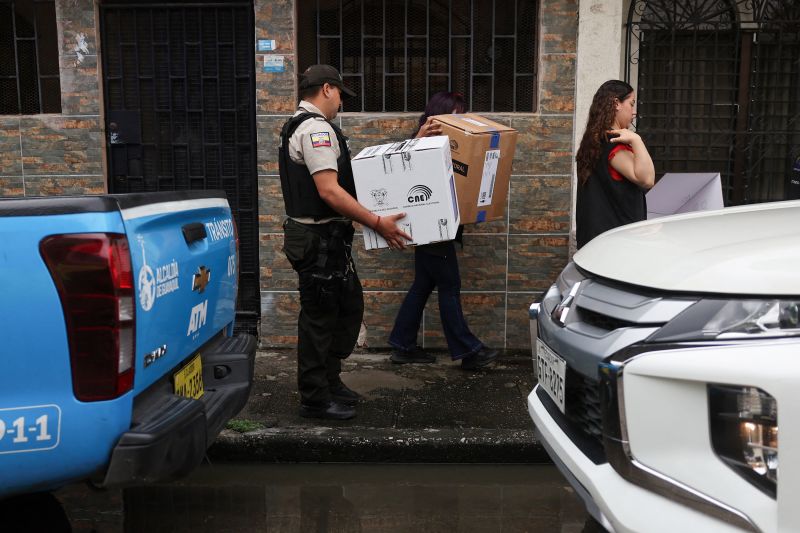
Ecuador votes for a new president after years of violence and blackouts
Ecuadorian voters are preparing to cast their ballots for a new president for the second time in 18 months amid an unprecedented security crisis in the country.
Ecuadorian President Daniel Noboa, the son of a banana tycoon, was elected in 2023 to finish the term of his predecessor Guillermo Lasso, who had resigned, dissolved congress and triggered new elections to avoid impeachment.
On Sunday, voters will decide whether to stick with Noboa’s course against the country’s crime epidemic or seek an alternative voice in his political rival Luisa González.
Here’s what you need to know:
Who is Daniel Noboa?
Noboa, a 37-year-old businessman, was the dark horse candidate of the 2023 election, beating González in that year’s second round vote. He sought to distinguish himself as “center left” during the 2023 campaign but has adopted a hardline approach to fighting crime during his short first term.
Noboa has presided over a series of crises in his term. He has declared numerous states of emergency, deployed military units to tackle gang activity in the country’s streets, and began construction on a new maximum-security prison after an infamous criminal leader escaped from custody last year.
Last year, he shocked Latin American leaders when he broke diplomatic norms and ordered an unprecedented operation to arrest Jorge Glas, a former Ecuadorean vice president, from the Mexican embassy in Quito. Glas, who is twice convicted for corruption, had been seeking asylum from Mexico when the raid took place.
Noboa, who was born in the US, continued the close relations with the United States that were cultivated under Lasso. The president has ratified two military cooperation agreements with the US military during his first term. He has also advocated for the US to re-establish a military base in Ecuador to help fight the drug trade.
He even attended US President Donald Trump’s inauguration in January and later followed Trump’s lead by declaring tariffs on Mexican goods.
The incumbent president has also called for further investment in public infrastructure, and has aimed to eliminate what he calls Ecuador’s “uncontrollable deficit” through an increase in Value-Added Tax.
Who is his competition?
Noboa will face off against leftist politician González and 14 other candidates on Sunday. Unless one candidate pulls through with more than 50% of the vote, or the margin between the two most popular candidates is more than 10% wide, the election will proceed to a second round in April.
Noboa’s main rival González is a close confidante of former leftist President Rafael Correa, still a dominant figure in Ecuador’s politics. During the 2023 campaign, Correa supported González’ run from exile in Belgium. In 2020, the former president was sentenced in absentia to eight years in prison for aggravated bribery, a charge he has repeatedly denied.
Running to “Revive Ecuador,” González has pledged to tackle the drug trade just as vigorously as Noboa. She’s argued that the government should eliminate SNAI, which manages the country’s prisons, and invest in facial recognition technology to curb lawbreaking. She also wants to reestablish the Ministry of Justice, which Ecuador shuttered in 2018 to reduce public spending.
Noboa’s first term has seen widespread blackouts in Ecuador, and both candidates have pledged to increase the supply of alternative energy sources.
Gonzalez’ plan calls for increased private sector investment in wind and solar power, while Noboa’s administration recently passed a law through Congress deregulating private use of both kinds of energy. González insists that the government ought to directly manage its drought-crippled hydroelectric plants, which supply almost 80% of Ecuador’s electricity.
“I’m the president of my party,” González said, “I’m the one leading my campaign – it’s my government plan, and my plans for the public. So who will rule? It’ll be Luisa (González).”
Why has violence spiked in the country?
Ecuador has become a cocaine trafficking hub, according to security experts and a United Nations Office on Drugs and Crime report. Though Ecuador has historically avoided the cocaine trade, it’s located between the two largest narcotics production hotspots in the world, Peru and Colombia. Ecuador’s ports are now a major exit point for South American cocaine headed to North America and Europe, the UN says.
This newfound position in the international drug trade has sparked a protracted security crisis. Between 2021 and 2023, according to Human Rights Watch, the Ecuadorian homicide rate more than tripled, though the government has said that murders have dropped 16.5% in 2024.
Criminal organizations and local gangs have engaged in corruption and extortion, overrun prisons, and murdered numerous politicians.
During the last election, presidential candidate and anti-corruption activist Fernando Villavicencio was gunned down just days before the first votes were cast. Five people were later imprisoned for his murder, with prosecutors accusing two of them of being members of the notorious Los Lobos gang.
What are the other issues?
Alongside crime, drought from the El Niño weather phenomenon has crippled Ecuador’s hydroelectric plants and thrown the country into an energy crisis. To conserve electricity, the government has orchestrated several power cuts, some extending as long as 14 hours. Though the cuts ended in December, there is still an energy deficit.
Ecuador would typically buy electricity from its neighbor Colombia, but a prolonged regional drought has weakened electrical grids throughout the region.
The blackouts have come alongside a dire economic situation in the country. A World Bank study from October 2024 further noted that a little over half of the country’s jobs are informal and unregulated by the government, leaving a significant amount of potential tax revenue out of Ecuador’s coffers.
According to an editorial written by Isabel Chiriboga, a Latin America expert at the non-partisan think tank Atlantic Council, the next president will have the unenviable job of stewarding an economy “teetering on the brink of collapse.”
